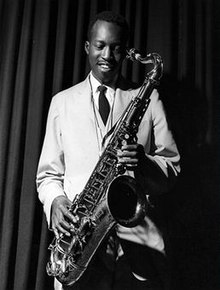Hank Mobley
| Hank Mobley | |
|---|---|

Mobley c. 1956
|
|
| Background information | |
| Birth name | Henry Mobley |
| Born |
July 7, 1930 Eastman, Georgia, U.S. |
| Died | May 30, 1986 (aged 55) Philadelphia, Pennsylvania, U.S. |
| Genres | Jazz, hard bop, soul jazz |
| Occupation(s) | Composer, saxophonist |
| Instruments | Tenor saxophone |
| Years active | 1949–1986 |
| Labels | Blue Note, Prestige, Savoy |
Henry "Hank" Mobley (July 7, 1930 – May 30, 1986) was an American hard bop and soul jazz tenor saxophonist and composer. Mobley was described by Leonard Feather as the "middleweight champion of the tenor saxophone", a metaphor used to describe his tone, that was neither as aggressive as John Coltrane nor as mellow as Stan Getz, and his style that was laid-back, subtle and melodic, especially in contrast with players like Sonny Rollins and Coltrane. The critic Stacia Proefrock claimed he is "one of the most underrated musicians of the bop era."
Mobley was born in Eastman, Georgia, but was raised in Elizabeth, New Jersey, near Newark. When he was 16, an illness kept him in the house for several months. His grandmother thought of buying a saxophone to help him occupy his time, and it was then that Mobley began to play. He tried to enter a music school in Newark, but couldn't, since he was not a resident, so he kept studying through books at home. At 19, he started to play with local bands and, months later, worked for the first time with musicians like Dizzy Gillespie and Max Roach. He took part in one of the earliest hard bop sessions, alongside Art Blakey, Horace Silver, Doug Watkins and trumpeter Kenny Dorham. The results of these sessions were released as Horace Silver and the Jazz Messengers. They contrasted with the classical inclinations of cool jazz, with Mobley's rich lyricism being bluesier, alongside the funky approach of Silver. When The Jazz Messengers split in 1956, Mobley continued on with pianist Silver for a short time, although he did work again with Blakey some years later, when the drummer appeared on Mobley's albums in the early 1960s.
...
Wikipedia
